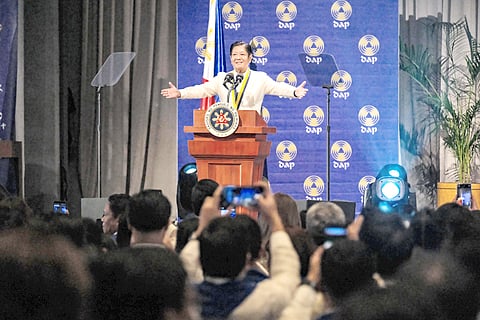
- NEWS
- the EDIT
- COMMENTARY
- BUSINESS
- LIFE
- SHOW
- ACTION
- GLOBAL GOALS
- SNAPS
- DYARYO TIRADA
- MORE

President Ferdinand Marcos Jr. admitted Friday that the series of arrests of Chinese suspected of engaging in espionage had caused apprehensions to him and security officials.
The Chief Executive said he is “very disturbed” by the increasing cases of Chinese moles.
“That’s why we arrested them. Of course, we are very disturbed by anyone conducting such espionage operations against our military,” Marcos told reporters in Pasay City.
The National Security Council (NSC) said the activities of the foreigners posed a serious concern to national security.
In a statement on Friday, National Security Adviser Eduardo Año said the seizures, including the surveillance of assets from the Philippine Navy and the Philippine Coast Guard in Palawan province, should not be ignored as it “could compromise our national security.”
Mr. Marcos said the Philippine government has not raised the issue with China but stressed that investigations are being held to look for more information.
“The investigative services are still developing more information to see exactly what these five have been --- what operations they have been doing while they have been here in the Philippines,” he said.
“Some of the suspected spies have been here for a long time, they have married Filipinas. They’re sleepers. They are called sleepers. Maybe when we talk to them, they can tell us who the others we can go to, explain what they’re really doing,” Marcos added.
National Bureau of Investigation (NBI) and Armed Forces of the Philippines (AFP) officials presented to the media the five suspects who were allegedly engaged in intelligence, surveillance, and reconnaissance operations in the country.
Footage from drones and military-grade, high-resolution video cameras disguised to look like civilian security closed circuit TVs (CCTVs) were also found.
The five suspects were identified as Cai Shaohuang, Cheng Hai Tao, Wu Cheng Ting, Wang Yong Yi and Wu Chin Ren.
AFP chief Gen. Romeo Brawner Jr. said data collected from the solar-powered video cameras were “being sent real-time” to a remote location.
Photos recovered include images on the Naval Detachment Oyster Bay in Barangay Bahile in Puerto Princesa, Palawan, which is part of the Philippine Navy’s Naval Forces West (Navforwest) positioned near the contested West Philippine Sea (WPS).
Other images showed the Philippine Navy’s Del Pilar Class offshore patrol vessel BRP Ramon Alcaraz (PS 16), maps overlooking the Subic Bay International Airport, and the Naval Operating Base Subic.
There was also footage of the Philippine Coast Guard vessels BRP Teresa Magbanua and BRP Gabriela Silang docked in the PCG Maritime Safety Service Unit NCR-Cluster, officials said.
The arrests were made following pursuit operations on 24 to 25 January in Palawan, the Ninoy Aquino International Airport, and in Dumaguete City, Negros Oriental.
“Their activities near Ulugan Bay and Naval Detachment Oyster Bay in Palawan, as well as their surveillance of Coast Guard stations and naval docks, are serious concerns that warrant a firm and coordinated response,” he said.
Decisive actions praised
Año also commended the Armed Forces of the Philippines (AFP), the Intelligence Service of the AFP (ISAFP), the National Intelligence and Security Force, the National Bureau of Investigation, and the Bureau of Immigration “for their decisive actions” during recent operations in Palawan province.
“The swift and coordinated efforts of our intelligence and law enforcement agencies in tracking, apprehending, and investigating these individuals demonstrate our commitment to prevent any activity that could compromise our national security,” he said.
“This operation also underscores the need for continued vigilance and proactive counterintelligence measures to detect and disrupt any attempts at espionage within our borders,” he added.
The cases of espionage emerged while the tensions between the Philippines and China ran high over territorial disputes in the West Philippine Sea.
Año said the arrested Chinese nationals were placed under surveillance of the military officials and law enforcers, following the earlier arrest of Deng Yuanqing, along with his two Filipino accomplices, who were caught conducting aerial reconnaissance and snooping on naval assets in parts of Luzon.
The government “remains committed to enforcing the law and ensuring that those found engaging in espionage and intelligence operations are held accountable.”
Año then assured the public that the Philippines “will continue to strengthen counterintelligence and monitoring efforts” against similar acts “to strengthen our national security.”
China earlier called out the Philippines and accused Filipinos of hyping the espionage issue.
